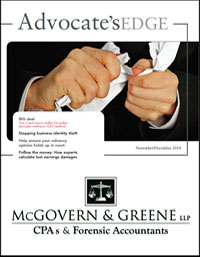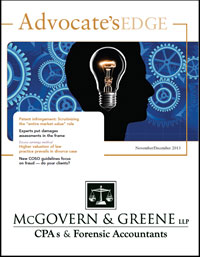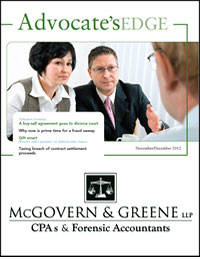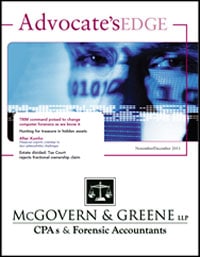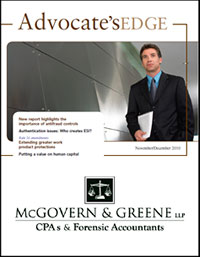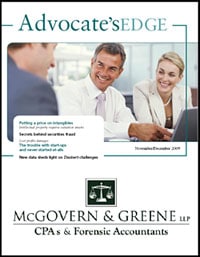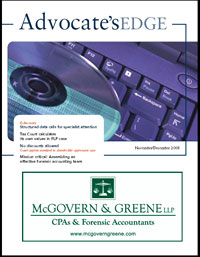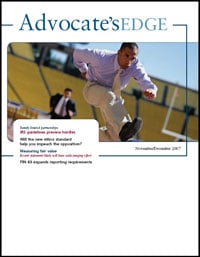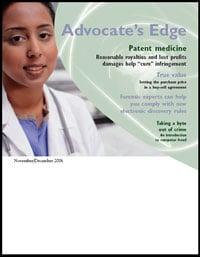Advocate’s Edge
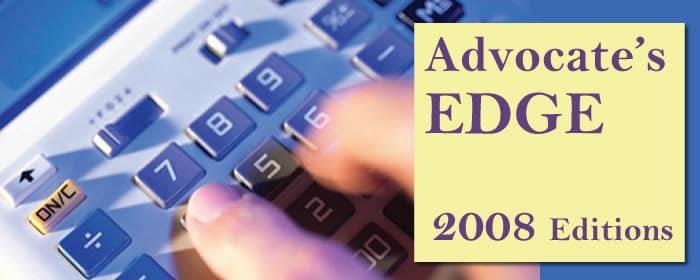
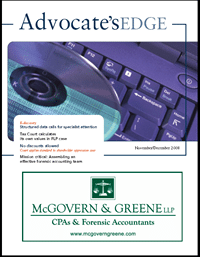 NOV / DEC 2008 ISSUE OF ADVOCATE’S EDGE
NOV / DEC 2008 ISSUE OF ADVOCATE’S EDGE
E-discovery
Structured data calls for specialist attention
Some attorneys have learned the hard way that e-discovery often means gathering and analyzing millions of bytes of information. Although much attention has been focused on discovery of “unstructured data” such as e-mail and documents, e-discovery also encompasses “structured data,” a category that includes human resource system and enterprise resource planning data. As this article argues, proper retrieval and handling of structured data differs from that associated with unstructured data sources and usually requires the assistance of a specialist.
Tax Court calculates its own values in FLP case
In recent years, the U.S. Tax Court has heard its share of cases challenging the legitimacy of family limited partnerships (FLPs). In early 2008, though, it was presented with an FLP case in which the IRS merely challenged the taxpayer’s valuation. The court in Astleford v. Commissioner ultimately decided to pick and choose from the opposing experts’ conclusions to calculate its own values. This article explains how the court arrived at its numbers and what it could mean for taxpayers.
No discounts allowed
Court applies standard to shareholder oppression case
Discounts for lack of control and marketability generally aren’t applied when valuing interests in the context of a shareholder dissent case. But, in Edler v. Edler, a Wisconsin court recently extended the principle to a shareholder oppression case, and as a result based the plaintiff’s award on the fair value of the corporation. This article summarizes the facts and findings of the case and discusses the implications.
Mission critical: Assembling an effective forensic accounting team
As fraud schemes become more complicated and sophisticated, it’s increasingly vital to build an effective forensic accounting team to investigate fraud incidents. This article explains why team members must be free of conflicts, why at least one member should be familiar with issues relating to potential litigation and why members must have practical — not just theoretical — experience with the matter at hand.
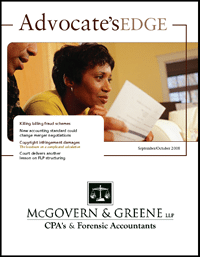 SEP/OCT 2008 Issue of Advocate’s Edge
SEP/OCT 2008 Issue of Advocate’s Edge
Killing billing fraud schemes
Motivated by the potential for big rewards, occupational thieves have come up with a variety of billing fraud schemes. But businesses and their legal advisors can help prevent large losses and possibly enhance their chances of a successful prosecution if they understand how fraud experts uncover them. This article describes how pass-through, personal purchase, pay-and-return and shell company schemes work, and how to spot them.
New accounting standard could change merger negotiations
Late last year, the Financial Accounting Standards Board (FASB) issued a revision of the accounting rules for mergers and acquisitions. FASB Statement No. 141R, Business Combinations, revises the earlier FASB Statement No. 141. As this article explains, it expands the scope of covered business combinations, revises the treatment of transaction costs and addresses the recognition of intangible assets, bargain purchases and contingencies. These changes could affect the value of a combination deal.
Copyright infringement damages
The lowdown on a complicated calculation
This article summarizes the methods CPAs use when calculating copyright infringement damages. Under the Copyright Act, copyright holders are generally entitled to recover actual damages suffered as a result of infringement. Experts must calculate lost sales from the infringer’s sales, copyright holder’s projections, diverted sales or product mix relationships and consider deductions such as the lost interest or earnings on the lost sales.
Court delivers another lesson on FLP structuring
This article summarizes the most recent important court ruling on FLPs. The court, in Bigelow v. Commissioner, found that the decedent’s gross estate must include the full fair market value of property that had been transferred to the FLP. This ruling reinforces the notion that, when it comes to FLPs, substance is more important than form.
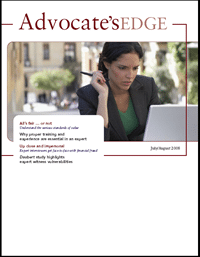 JUL/AUG 2008 Issue of Advocate’s Edge
JUL/AUG 2008 Issue of Advocate’s Edge
All’s fair … or not
Understand the various standards of value
The need for business valuations arises in myriad types of litigation, but valuation is seldom as simple as it might seem. The final appraisal estimate is influenced by a variety of factors, including the standard of value. This article outlines the various value standards — fair market, fair, investment and intrinsic — how they differ from one another and how professional valuators decide when to apply each.
Why proper training and experience are essential in an expert
This article discusses a recent tax court decision, Estate of Thompson v. Commissioner, and how it serves as a reminder that attorneys and their clients can’t afford to cut corners when selecting experts. Specifically, choosing experts based on criteria other than their experience and expertise with the specific matter at hand may fail to demonstrate reasonable cause and good faith.
Up close and impersonal
Expert interviewers get face-to-face with financial fraud
The key to uncovering or confirming financial fraud often lies in one-on-one interviews. As this article explains, skilled interviewers trained in fraud detection know how to spot fraud warning signs, detect deception and pin down suspicions when talking with suspects and their co-workers. Attorneys and their clients may only get one chance for an initial employee interview, so it’s essential they make sure it’s effective.
Daubert study highlights expert witness vulnerabilities
Since the U.S. Supreme Court’s 1999 decision in Kumho Tire v. Carmichael extended the Daubert criteria for admissibility of expert scientific testimony, federal and state courts have heard more challenges to financial expert testimony. A PricewaterhouseCoopers study of post-Kumho challenges to financial experts from 2000 through 2006 identifies trends that attorneys may be able to leverage when submitting expert testimony. This article talks about the study’s findings and how they can be used to prevent expert testimony from being excluded.
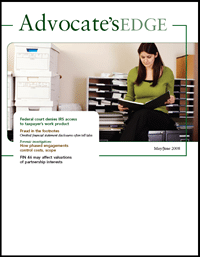 MAY/JUN 2008 Issue of Advocate’s Edge
MAY/JUN 2008 Issue of Advocate’s Edge
Federal court denies IRS access to taxpayer’s work product
A recent federal court decision lends support to taxpayers’ efforts to protect their tax accrual workpapers from disclosure to the IRS. The ruling in U.S. v. Textron Inc. (D.R.I. 2007) could prove critical in light of a relatively new accounting standard, FIN 48, which requires corporate taxpayers to document their uncertain tax positions and make related public disclosures. But because the years at issue in Textron occurred before the standard’s effective date, it remains unclear whether required public filing disclosures required will waive work product privilege.
Fraud in the footnotes
Omitted financial statement disclosures often tell tales
Omissions in the footnotes of financial statements may distort assets, revenues, liabilities and expenses. Such distortions can prove relevant to a range of legal matters, including shareholder disputes, D&O liability, and mergers and acquisitions. This article lists common types of fraudulent omissions and explains how forensic accountants unearth critical information.
Forensic investigations
How phased engagements control costs, scope
A phased engagement breaks down the scope and time frame of a forensic accounting investigation into steps, which are predetermined by the attorney, client and accountant. As this article discusses, each stage comes with its own set of deliverables, making it easier to manage time and costs. Results are based on limits, also of the attorney’s design, which keep the investigation process from going on longer than it needs to.
FIN 46 may affect valuations of partnership interests
Several years ago, the Financial Accounting Standards Board released Interpretation No. 46 (FIN 46), Consolidation of Variable Interest Entities. This interpretation requires the consolidation of business enterprises with certain related entities on their financial statements. This article talks about the implications of FIN 46 when valuing partnership interests for litigation purposes, including consolidating a variable interest entity.
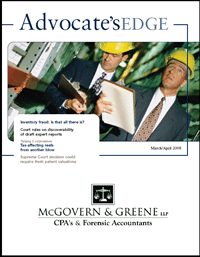 MAR/APR 2008 Issue of Advocate’s Edge
MAR/APR 2008 Issue of Advocate’s Edge
Inventory fraud: Is that all there is?
Inventory fraud costs businesses millions of dollars every year: According to the Association of Certified Fraud Examiners, the median annual loss from inventory fraud schemes was $200,000. But inventory fraud can lead to more than just financial losses.
It can also create corporate compliance issues under the Sarbanes-Oxley Act and other laws, regulations and accounting standards. This article details the most common types of fraud schemes and how to prevent inventory fraud from happening in the first place.
Court rules on discoverability of draft expert reports
When experts perform valuations for litigation purposes, issues can arise over the discoverability of their draft reports and their duty to preserve them as well as correspondence related to the drafts. A recent federal district court decision, University of Pittsburgh v. Townsend (E.D. Tenn. 2007), provides valuable guidance for attorneys and accounting experts by clarifying experts’ duties to preserve and disclose draft reports. This article discusses the case and the court’s findings.
Valuing S corporations
Tax-affecting reels from another blow
In Bernier v. Bernier (Mass. 2007), the court considered whether tax-affecting — which reduces a business’s projected future income by deducting hypothetical corporate income taxes — was inappropriate in valuing an S corporation. This article explains how the Bernier court arrived at the decision that the value of closely held companies with flow-through tax benefits should not be reduced by a full tax-affecting.
Supreme Court decision could require fresh patent valuations
A U.S. Supreme Court ruling welcomed by many in the technology arena may have made it more difficult to obtain and retain patent protection. The decision in KSR International Co. v. Teleflex Inc (U.S. 2007) could diminish the value of some patents and their related revenues. Because it has implications for compliance with the Sarbanes-Oxley Act (SOX) and certain accounting standards, some companies may require new patent valuations.
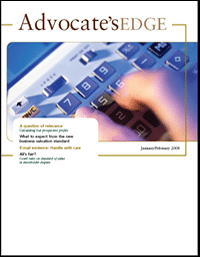 JAN/FEB 2008 Issue of Advocate’s Edge
JAN/FEB 2008 Issue of Advocate’s Edge
A question of relevance
Calculating lost prospective profits
Establishing lost profits for businesses that were never actually operational can prove difficult. In Parlour Enterprises Inc. v. The Kirin Group, a California appellate court weighed in on the key factors to consider when calculating prospective profits in such cases. As this article explains, the court’s decision emphasizes the need to hire qualified valuators who can build a case with reasonable certainty by using, for example, expert testimony, financial data and market surveys.
What to expect from the new business valuation standard
The Association of International Certified Professional Accountants (AICPA) has issued a new valuation standard that takes effect for engagements accepted on or after Jan. 1, 2008. Statement on Standards for Valuation Services No. 1, Valuation of a Business, Business Ownership Interest, Security, or Intangible Asset applies to all AICPA members, including those who perform valuations for certain purposes — including transactions, financings and taxation. This article discusses how the new standard can affect attorneys by permitting only two types of engagement reports.
E-mail evidence: Handle with care
In many, if not most, businesses, e-mail is the preferred communication tool these days. As such, it has assumed a prominent evidentiary role in all types of litigation. Proper handling of e-mail evidence is critical — the consequences of improper handling can range from sanctions to adverse jury instructions to devastating damages awards. To avoid these consequences, readers are encouraged to engage a forensic accounting expert who knows where to find hidden evidence and protect it from tampering.
All’s fair?
Court rules on standard of value in shareholder dispute
The recent decision in Kim v. The Grover C. Coors Trust demonstrates the dramatic consequences that the very different definitions of fair value and fair market value can create. This article explores the issues in question and reinforces the notion that the parties to a valuation should clearly define the standard of value at the beginning of an engagement.
This publication is distributed with the understanding that the author, publisher and distributor are not rendering legal, accounting or other professional advice or opinions on specific facts or matters, and, accordingly, assume no liability whatsoever in connection with its use.
GFAS Advocate's Edge Archives
Expert Forensic Accounting Services
Chicago | Las Vegas
FORENSIC ACCOUNTING
SERVICES
Insurance Claims
Accounting Investigations
Mergers & Acquisitions
Due Diligence Reviews
Dispute Advisory Services
Special Examinations
Contract Audits and Recoveries
LITIGATION SERVICES
Expert Witness Testimony
Commercial Damages
Shareholder/Partner Disputes
Bankruptcy and Insolvency
CPA Malpractice Claims
Contract Disputes
Estate and Trust Disputes
Data Mining & Electronic Discovery
FRAUD EXAMINATIONS

